There is no rational justification for contesting the World Cup's status as the greatest sporting event, as countless great players have graced the biggest platform on the planet over the years.
Some so many players are often considered to be the best football heroes throughout various World Cup events, from Miroslav Klose, whose career was hallmarked by fair play and decency, to the best players the world has ever seen like Pele and Maradona. Because of this, any attempt to compile a list of the top 10 football World Cup heroes of all time seems incredibly difficult and borderline absurd.
Even though it was hard, we did manage to put together that list. It consists of iconic players who all contributed greatly to their teams and, thanks to their World Cup triumphs, became idols to millions of fans worldwide. Others are known as key players who shined at every turning point of the match, bringing victory to their national teams. Read on to know whether your favorite players are on the list.
Greaves, who was already well-known in his own country, rose to prominence abroad after he saved a puppy that had gotten away from the Brazilian greats during England's 1962 World Cup quarterfinal. Greaves became renowned in Brazil as "Garrincha's dog-catcher" when Brazil's Garrincha took the dog home.
Greaves was a member of the 1966 World Cup-winning team but was unable to participate in the championship game due to a severe wound sustained by France's Joseph Bonnel that required 14 stitches.
Greaves set a record by scoring six hat-tricks while wearing the England jersey.
The 1966 season, the squad, and Greaves's transformation into a broadcaster who was welcomed into the country's living rooms for decades remain key components of English identity.
Prime Minister Gordon Brown ultimately presented Greaves with a World Cup medal in 2009.
He missed much of France's brief World Cup campaign in 2002 due to injuries, but he went on to win the 2006 tournament's player of the year award despite the controversial headbutt that got him sent off in the championship game. When the squad arrived home, tens of thousands of supporters lined the streets of Paris while yelling Zidane's name.
His talismanic leadership helped the national squad become far more than the sum of its parts, scoring 31 goals in 108 outings for France.
He went on to win three Champions League championships and two La Liga championships with Real Madrid as a coach.
He played four times for Spain and scored 84 goals in 85 games for Hungary. Hungary was so strong under Puskas that their lone loss over the whole decade was in the 1954 World Cup final. From 705 games in his career, he scored 702 goals. A fervent supporter of the 1956 Hungarian Revolution, the titan of European football defected to Spain while on tour after the Soviet Army killed 2,500 of his compatriots while putting down the uprising.
He returned to Hungary after communism fell, and Hungarians continue to revere him.
Matthaus has the record for playing in the most World Cup games and is the only German to be voted FIFA World Player of the Year (25). He had a dominating presence on the field thanks to his natural leadership, and his technical skill and tactical acumen provided him with an unbeatable edge.
the positive He was said to as the strongest opponent Diego Maradona has ever faced.
He was a physically dominant forward whose height belied his quickness. In 137 games while wearing a German jersey, he scored 71 goals. He also has 16 goals in the World Cup. Never has anybody scored more. He was a wonderful man and very productive.
Four years later, he led Brazil to the tournament final and was voted Player of the Tournament, but only hours before the game, he had a convulsive fit. In the 2002 World Cup final, he added two more goals to the six he had already scored in the campaign, winning the cup once more.
Ronaldo's then-record-breaking 15th World Cup goal came during his fourth World Cup participation.
But the way he did it, with his speed, control, vision, complete mastery of the ball, explosive runs, juggling the ball past defenders with acrobatic flips and tricks, and the goals, was what truly lit up the globe.
He participated in the 1966 World Cup final, which England won, and four years later, he exacted revenge by scoring a scorching goal to eliminate England and advance West Germany to the semi-final.
Three World Cup appearances, however, weren't enough for Beckenbauer, and as Germany moved toward reunification and a new era, he served as the team's manager and led them to the 1990 World Cup victory. Later on, he was in charge of Germany's successful 2006 World Cup bid, which FIFA later looked into for possible corruption.
For Cruyff, playing football was more than simply a physical activity; it was also a creative exercise that combined mind, body, and aesthetics.
He directed his team like an orchestra conductor, coming up with inventive plays and having a special understanding of the geometry of player pitch positions. He scored in every game that the Netherlands lost. He also scored a lot, tallying 33 goals across 48 international games.
Cruyff guided the Netherlands to the 1974 World Cup final, defeating reigning winners Brazil and scoring twice against Argentina. Only Franz Beckenbauer's defensive prowess prevented Cruyff from winning the title by thwarting his attempts to score.
After being the target of an abduction attempt, Cruyff reevaluated his ambitions on the world stage of football and decided not to participate in the 1978 competition. However, he left a ground-breaking legacy that extended beyond his time at Ajax and Barcelona, where he played and managed, to the Dutch national team and the future of the sport. Total Football, "tiki-taka," and the Cruyff turn are all examples of his knowledge of the proper method to play football.
The Argentinian captain's prodigious talent and complete disregard for the rules, along with his Shameless arrogance as a genius born in the ghetto, perfectly summed up Maradona's two sides. He believed that his natural talent elevated him above the common people around him.
Ten years after Maradona made his debut for the nation at the age of 16, Argentina went on to win the 1986 World Cup. No one can truly tell how much more glory he may have basked in had his 1991 cocaine possession arrest not sent his off-field life into a tailspin. He won 91 caps and scored 34 goals for his nation. He participated in four World Cup competitions, but the 1994 World Cup was cut short after a drug test revealed he had used the illegal stimulant ephedrine.
After his playing career came to an end, he continued to promote left-wing causes, speaking out against the Iraq War, debating the Pope over the allocation of wealth, and denouncing Israel's bombardment of Gaza. At the 2007 Copa America, Maradona was Hugo Chavez's guest of honor and had tattoos of Fidel Castro and Che Guevara on his body.
Due to Maradona's fame in Argentina, when he passed away at the age of 60 from a cardiac arrest, his coffin was decorated with football jerseys and draped in the national flag and laid in state at the presidential palace as tens of thousands of mourners paid their respects.
Could anybody have imagined the behemoth he would become when he scored his first World Cup goal in 1958, the consequence of a scuffed mishit that put an end to Wales' World Cup ambitions for the next seven decades?
Pele could create magic with either foot, inspiring generations. He became a national hero off the field for his vocal support of enhancing the lives of the underprivileged as one of the first worldwide Black sports celebrities.
The three times Pele won the World Cup were in 1958, 1962, and 1970. With 77 goals in 92 appearances, he continues to be the best goal-scorer in Brazil. Because of his immense fame and popularity, the deadly civil war in Nigeria in 1969 came to an end so that all sides could see Pele play in an exhibition game in Lagos.
He was a prolific goal scorer and has the vision and style to play from any position on the pitch. He never acted independently; instead, he collaborated with others to create helpful assistance. His dynamic leadership both on and off the field helped him leave behind a legacy that Henry Kissinger and Nelson Mandela both praised.
Michel Platini of France said, "There's Pelé the man and then there's Pelé the player. Additionally, "playing like Pelé is playing like God."
Some so many players are often considered to be the best football heroes throughout various World Cup events, from Miroslav Klose, whose career was hallmarked by fair play and decency, to the best players the world has ever seen like Pele and Maradona. Because of this, any attempt to compile a list of the top 10 football World Cup heroes of all time seems incredibly difficult and borderline absurd.
Even though it was hard, we did manage to put together that list. It consists of iconic players who all contributed greatly to their teams and, thanks to their World Cup triumphs, became idols to millions of fans worldwide. Others are known as key players who shined at every turning point of the match, bringing victory to their national teams. Read on to know whether your favorite players are on the list.
#10 Jimmy Greaves
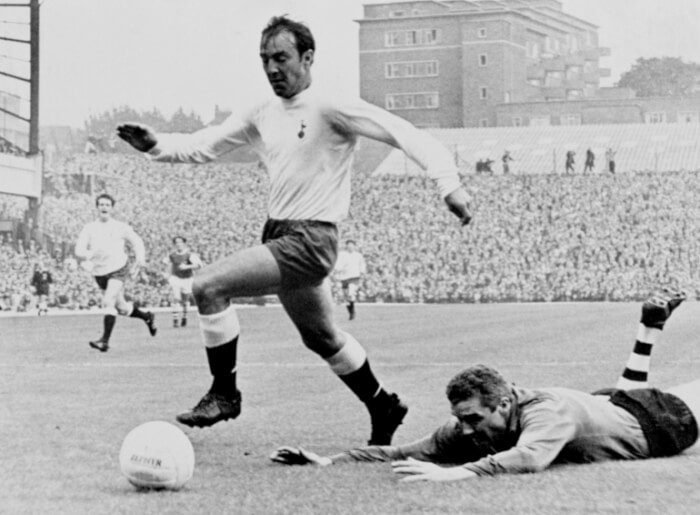 Source: Action Images
Source: Action Images
Greaves, who was already well-known in his own country, rose to prominence abroad after he saved a puppy that had gotten away from the Brazilian greats during England's 1962 World Cup quarterfinal. Greaves became renowned in Brazil as "Garrincha's dog-catcher" when Brazil's Garrincha took the dog home.
Greaves was a member of the 1966 World Cup-winning team but was unable to participate in the championship game due to a severe wound sustained by France's Joseph Bonnel that required 14 stitches.
Greaves set a record by scoring six hat-tricks while wearing the England jersey.
The 1966 season, the squad, and Greaves's transformation into a broadcaster who was welcomed into the country's living rooms for decades remain key components of English identity.
Prime Minister Gordon Brown ultimately presented Greaves with a World Cup medal in 2009.
#9 Zinedine Zidane
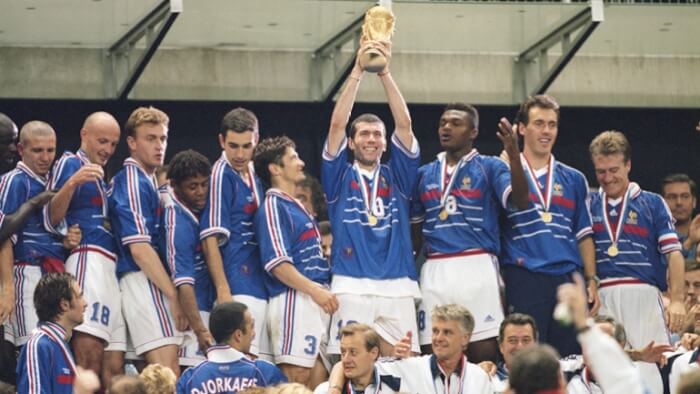 Source: Ben Radford/Allsport via Getty Images
Source: Ben Radford/Allsport via Getty Images
He missed much of France's brief World Cup campaign in 2002 due to injuries, but he went on to win the 2006 tournament's player of the year award despite the controversial headbutt that got him sent off in the championship game. When the squad arrived home, tens of thousands of supporters lined the streets of Paris while yelling Zidane's name.
His talismanic leadership helped the national squad become far more than the sum of its parts, scoring 31 goals in 108 outings for France.
He went on to win three Champions League championships and two La Liga championships with Real Madrid as a coach.
#8 Ferenc Puskas
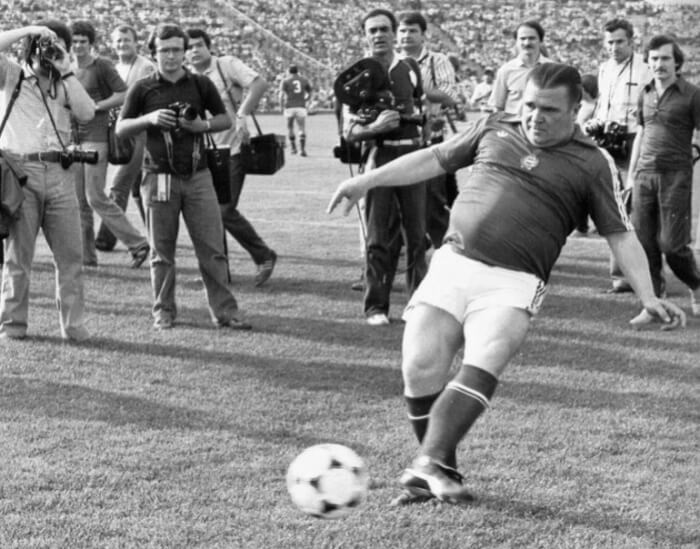 Source: Laszlo Balogh/Reuters
Source: Laszlo Balogh/Reuters
He played four times for Spain and scored 84 goals in 85 games for Hungary. Hungary was so strong under Puskas that their lone loss over the whole decade was in the 1954 World Cup final. From 705 games in his career, he scored 702 goals. A fervent supporter of the 1956 Hungarian Revolution, the titan of European football defected to Spain while on tour after the Soviet Army killed 2,500 of his compatriots while putting down the uprising.
He returned to Hungary after communism fell, and Hungarians continue to revere him.
#7 Lothar Matthaus
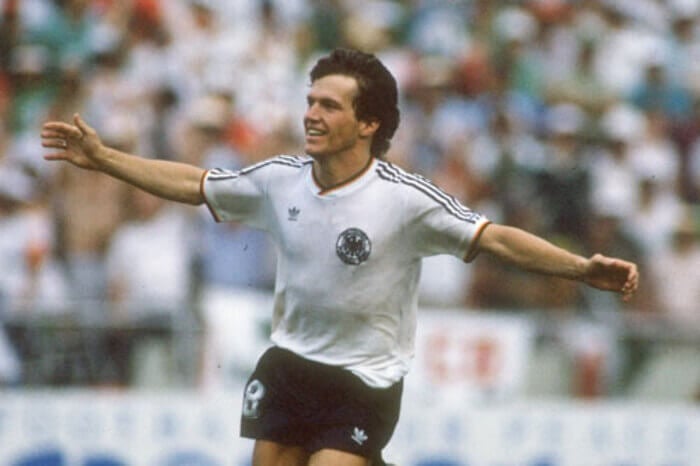 Source: Getty Images
Source: Getty Images
Matthaus has the record for playing in the most World Cup games and is the only German to be voted FIFA World Player of the Year (25). He had a dominating presence on the field thanks to his natural leadership, and his technical skill and tactical acumen provided him with an unbeatable edge.
the positive He was said to as the strongest opponent Diego Maradona has ever faced.
#6 Miroslav Klose
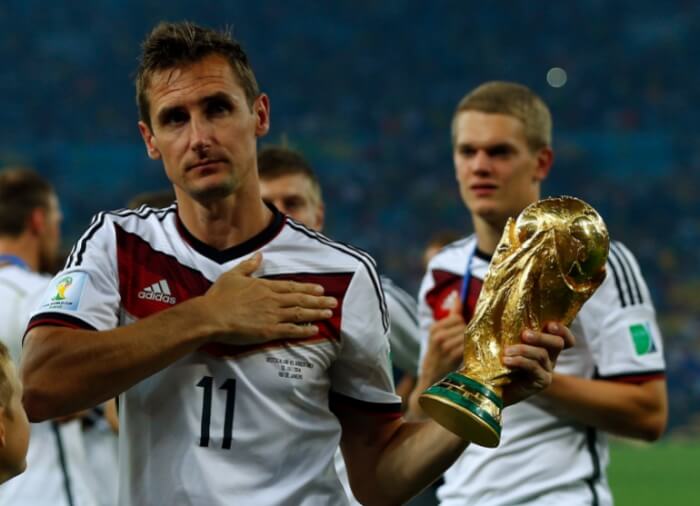 Source: Eddie Keogh/Reuters
Source: Eddie Keogh/Reuters
He was a physically dominant forward whose height belied his quickness. In 137 games while wearing a German jersey, he scored 71 goals. He also has 16 goals in the World Cup. Never has anybody scored more. He was a wonderful man and very productive.
#5 Ronaldo
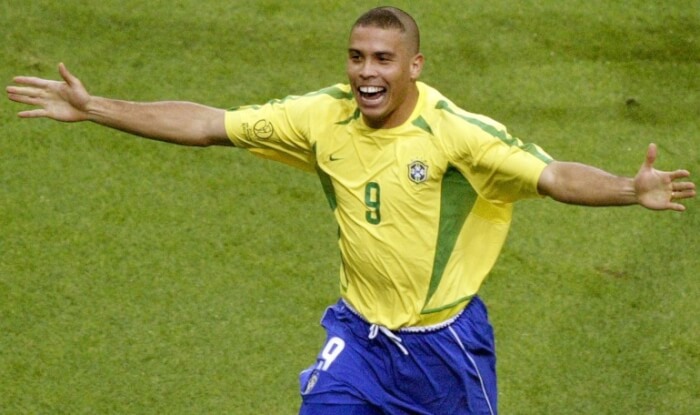 Source: Reuters
Source: Reuters
Four years later, he led Brazil to the tournament final and was voted Player of the Tournament, but only hours before the game, he had a convulsive fit. In the 2002 World Cup final, he added two more goals to the six he had already scored in the campaign, winning the cup once more.
Ronaldo's then-record-breaking 15th World Cup goal came during his fourth World Cup participation.
But the way he did it, with his speed, control, vision, complete mastery of the ball, explosive runs, juggling the ball past defenders with acrobatic flips and tricks, and the goals, was what truly lit up the globe.
#4 Franz Beckenbauer
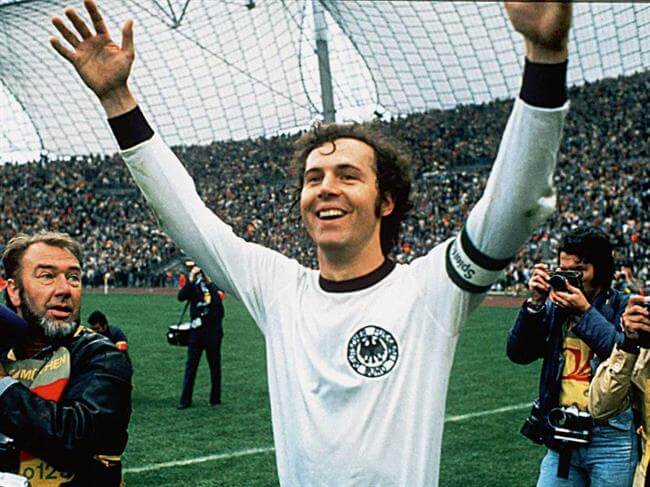 Source: Albert Gea/Reuters
Source: Albert Gea/Reuters
He participated in the 1966 World Cup final, which England won, and four years later, he exacted revenge by scoring a scorching goal to eliminate England and advance West Germany to the semi-final.
Three World Cup appearances, however, weren't enough for Beckenbauer, and as Germany moved toward reunification and a new era, he served as the team's manager and led them to the 1990 World Cup victory. Later on, he was in charge of Germany's successful 2006 World Cup bid, which FIFA later looked into for possible corruption.
#3 Johan Cruyff
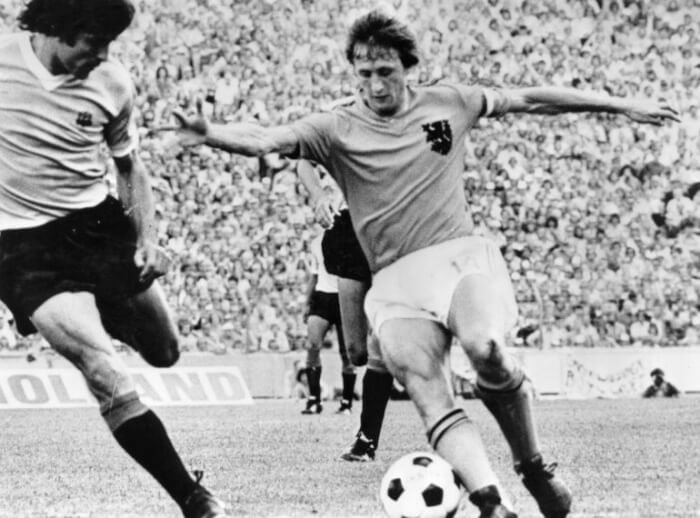 Source: Keystone via Getty Images
Source: Keystone via Getty Images
For Cruyff, playing football was more than simply a physical activity; it was also a creative exercise that combined mind, body, and aesthetics.
He directed his team like an orchestra conductor, coming up with inventive plays and having a special understanding of the geometry of player pitch positions. He scored in every game that the Netherlands lost. He also scored a lot, tallying 33 goals across 48 international games.
Cruyff guided the Netherlands to the 1974 World Cup final, defeating reigning winners Brazil and scoring twice against Argentina. Only Franz Beckenbauer's defensive prowess prevented Cruyff from winning the title by thwarting his attempts to score.
After being the target of an abduction attempt, Cruyff reevaluated his ambitions on the world stage of football and decided not to participate in the 1978 competition. However, he left a ground-breaking legacy that extended beyond his time at Ajax and Barcelona, where he played and managed, to the Dutch national team and the future of the sport. Total Football, "tiki-taka," and the Cruyff turn are all examples of his knowledge of the proper method to play football.
#2 Diego Maradona
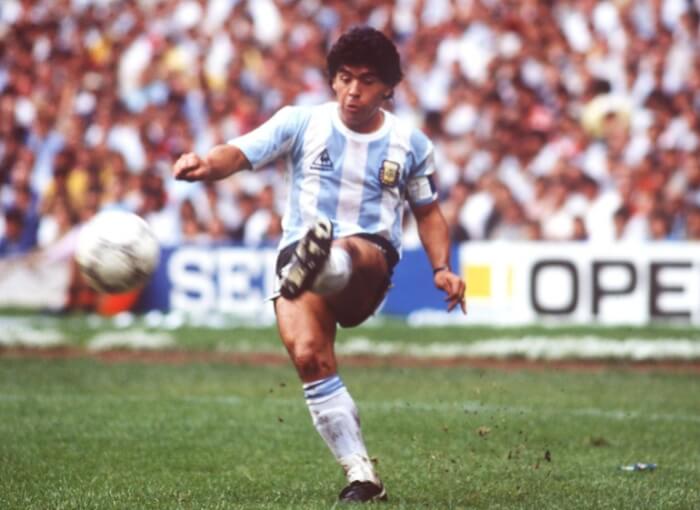 Source: Bongarts via Getty Images
Source: Bongarts via Getty Images
The Argentinian captain's prodigious talent and complete disregard for the rules, along with his Shameless arrogance as a genius born in the ghetto, perfectly summed up Maradona's two sides. He believed that his natural talent elevated him above the common people around him.
Ten years after Maradona made his debut for the nation at the age of 16, Argentina went on to win the 1986 World Cup. No one can truly tell how much more glory he may have basked in had his 1991 cocaine possession arrest not sent his off-field life into a tailspin. He won 91 caps and scored 34 goals for his nation. He participated in four World Cup competitions, but the 1994 World Cup was cut short after a drug test revealed he had used the illegal stimulant ephedrine.
After his playing career came to an end, he continued to promote left-wing causes, speaking out against the Iraq War, debating the Pope over the allocation of wealth, and denouncing Israel's bombardment of Gaza. At the 2007 Copa America, Maradona was Hugo Chavez's guest of honor and had tattoos of Fidel Castro and Che Guevara on his body.
Due to Maradona's fame in Argentina, when he passed away at the age of 60 from a cardiac arrest, his coffin was decorated with football jerseys and draped in the national flag and laid in state at the presidential palace as tens of thousands of mourners paid their respects.
#1 Pele
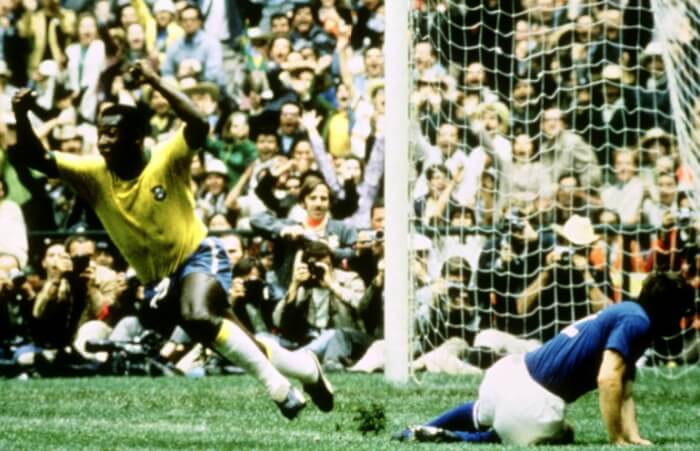 Source: Action Images via Reuters
Source: Action Images via Reuters
Could anybody have imagined the behemoth he would become when he scored his first World Cup goal in 1958, the consequence of a scuffed mishit that put an end to Wales' World Cup ambitions for the next seven decades?
Pele could create magic with either foot, inspiring generations. He became a national hero off the field for his vocal support of enhancing the lives of the underprivileged as one of the first worldwide Black sports celebrities.
The three times Pele won the World Cup were in 1958, 1962, and 1970. With 77 goals in 92 appearances, he continues to be the best goal-scorer in Brazil. Because of his immense fame and popularity, the deadly civil war in Nigeria in 1969 came to an end so that all sides could see Pele play in an exhibition game in Lagos.
He was a prolific goal scorer and has the vision and style to play from any position on the pitch. He never acted independently; instead, he collaborated with others to create helpful assistance. His dynamic leadership both on and off the field helped him leave behind a legacy that Henry Kissinger and Nelson Mandela both praised.
Michel Platini of France said, "There's Pelé the man and then there's Pelé the player. Additionally, "playing like Pelé is playing like God."